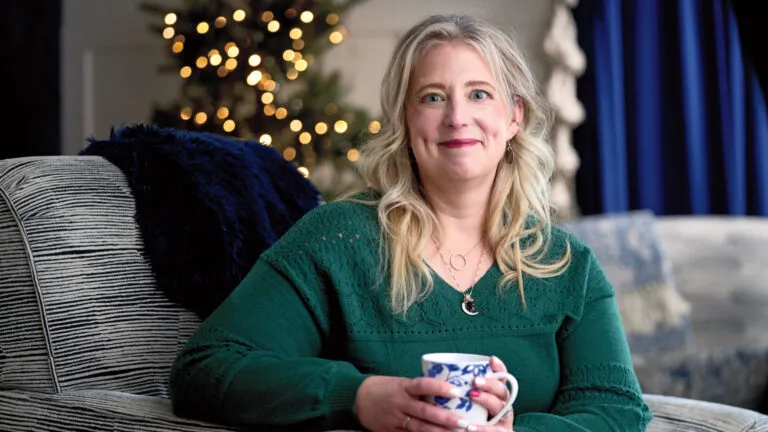The old, homeless man stood on the corner of a sidewalk in Greenwich Village in New York City. Among the used magazines, tattered clothing, and odds and ends he spread out to sell, a small plaque caught my eye. It read: “Jesus Is the Head of My House.”
The message was spelled out in silver letters that someone had glued on a five-by-seven-inch scrap of cardboard and then decorated with cutouts of strawberry-patterned wallpaper. The glass was dirty, the gray paint on the wooden frame was flaking. Maybe the old man had made it himself.
“Is $2 all right?” I asked, fishing in my purse.
He nodded. I gave him the money and tucked the plaque in a diaper bag slung over the back of the stroller where my son slept. Then I hurried home.
Even after I cleaned the glass and wiped the frame with a damp cloth, the plaque was dingy. So I hung it on a hook in our bedroom closet, where it played peekaboo through the hangers.
As the years passed and our children grew, the old plaque moved with us from our first apartment, on Horatio Street, crosstown to our co-op on East 11th Street, where I hung it on a nail above the laundry tub.
Then my husband, Tom, and I decided to move to the suburbs, where raising our children would be easier and less expensive. But caught in the Manhattan real-estate crash, we were unable to sell our co-op—even at a huge loss. So we rented a run-down house in Connecticut, and the plaque went on a cobwebby windowsill in the cellar. One winter’s day I found it face up on the linoleum floor, its glass broken into shards.
“Jesus Is the Head of My House.” Illuminated by the harsh glare of a naked bulb, the words seemed to mock me. What house? I wondered.
I hated the place we were renting. Cold in the winter, buggy in the summer, it bore the scars of tenant neglect. The harvest-gold paint on the outside was peeling, and the avocado-green shutters were rotting.
Tom’s family had mailed us a handsome personalized doormat for a housewarming present, but I couldn’t bring myself to put it out. This was not our home. I was ashamed to welcome any guests. More times than I cared to admit, I’d picked up the phone to ask someone over for coffee or supper and changed my mind at the last minute.
Sometimes I felt guilty for being unhappy. After all, we had much to be thankful for. We had found a good church. Our children, Katy and Brinck, were thriving at their new elementary school and making new friends. They relished the freedom of a backyard and loved riding their bikes up and down the block. Tom didn’t even mind the hour-plus commute on the train. We enjoyed the slower pace of life, the sound of wind in the trees, the red flash of a cardinal or the sight of deer nibbling on the rhododendron bushes.
Now I looked at the broken plaque lying on the basement floor. Gingerly I picked up a splinter of glass and tossed it into a plastic trash pail. I reached for another shard and tossed it, then another. Finally the glass was gone, but the framed message was still there: “Jesus Is the Head of My House.”
And I got the message at last. It was as though someone spoke the words with a forcefulness that jolted me out of my gloom. Of course! My house was not this leaky, creaky structure built on top of dreary concrete blocks. My house was not our unsold co-op in the city, nor would it be the suburban colonial we dreamed of buying someday.
My house is my heart. Every day I had the privilege of inviting Jesus to be the head—filling me with his hope, encouragement, guidance and love. My fingers traced the silver letters. Jesus hadn’t been the head of my house for a long time.
Lord, I prayed, I’m so sorry I’ve shut you out. Please come into my heart and be the head of my house.
I returned the plaque to its spot on the windowsill. Turning to go, I noticed a pile of boxes stacked under the basement stairwell. It took some rummaging, but I found what I was looking for. Running upstairs, I opened the front door and rolled out the doormat. “The Slatterys,” it said.
Would we ever sell our co-op? Would we ever own a home again? Somehow those questions didn’t seem to matter much anymore. I headed to the kitchen to phone a friend from church and invite her over for coffee. I was ready to be welcoming. Thanks to a homeless man, I knew where my home was—and to whom it belonged.




